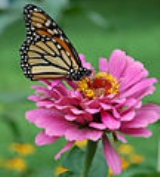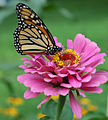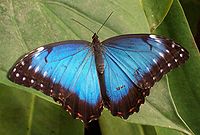
List of Butterflies of Tobago
Encyclopedia
The combined efforts of generations of resident and visiting naturalist
s have helped to make the butterfly
fauna of Tobago
well known. Some 123 species have been recorded on the island of Tobago that has a land area of only 300 km² (1P16 mi²) and is approximately 42 km long and 10 km wide.
This list follows Barcant (1970) who is the main source of information on the butterflies of Tobago. His book is no longer in print, but used copies are available at booksellers. Barcant gives each species an English common name, but many of these were never taken up. Barcant's English name and the more widely accepted English name are given in the list below. Since 1970 many of the Latin names used by Barcant have also changed. The 2004 catalog of Lamas was used to update the taxonomy.
There are little data on the seasonal distribution or abundance of the listed butterflies. In general, butterflies are more abundant in the wet season. However in the dry season, when most people visit, and especially if the dry season is a wet one, there are many whites/yellows on the wing. These are hard to identify without capture. Other butterflies commonly seen in the dry season in the south west of the island are the Monarch butterfly
(Danaus plexippus), the White Peacock (Anartia jatrophe), the Brown Peacock (Anartia amathea), the West Indian Buckeye (Junonia evarete) and the Red Rim (Biblis hyperia). Away from the flat south west towards Arnos vale, there are other many butterflies to be found, including skippers and blues and the Blue Tinted Handkerchief (Dynamine theseus). In the rain forest, on the main ridge, butterflies are quite scarce at this time of year.
.jpg)
Pieridae
Whites and yellows.
Nymphalidae
These are the four-footed butterflies. Their taxonomy is currently being revised.
Satyrinae
Browns.

Heliconiinae
Longwing butterflies.

Nymphalinae
Nymphs.
Biblidinae
Charaxinae
Morphinae

Brassolini
Owl Butterflies
Riodinidae
Metalmarks.
Lycaenidae
.jpg) Blues.
Blues.
Naturalist
Naturalist may refer to:* Practitioner of natural history* Conservationist* Advocate of naturalism * Naturalist , autobiography-See also:* The American Naturalist, periodical* Naturalism...
s have helped to make the butterfly
Butterfly
A butterfly is a mainly day-flying insect of the order Lepidoptera, which includes the butterflies and moths. Like other holometabolous insects, the butterfly's life cycle consists of four parts: egg, larva, pupa and adult. Most species are diurnal. Butterflies have large, often brightly coloured...
fauna of Tobago
Tobago
Tobago is the smaller of the two main islands that make up the Republic of Trinidad and Tobago. It is located in the southern Caribbean, northeast of the island of Trinidad and southeast of Grenada. The island lies outside the hurricane belt...
well known. Some 123 species have been recorded on the island of Tobago that has a land area of only 300 km² (1P16 mi²) and is approximately 42 km long and 10 km wide.
This list follows Barcant (1970) who is the main source of information on the butterflies of Tobago. His book is no longer in print, but used copies are available at booksellers. Barcant gives each species an English common name, but many of these were never taken up. Barcant's English name and the more widely accepted English name are given in the list below. Since 1970 many of the Latin names used by Barcant have also changed. The 2004 catalog of Lamas was used to update the taxonomy.
There are little data on the seasonal distribution or abundance of the listed butterflies. In general, butterflies are more abundant in the wet season. However in the dry season, when most people visit, and especially if the dry season is a wet one, there are many whites/yellows on the wing. These are hard to identify without capture. Other butterflies commonly seen in the dry season in the south west of the island are the Monarch butterfly
Monarch butterfly
The Monarch butterfly is a milkweed butterfly , in the family Nymphalidae. It is perhaps the best known of all North American butterflies. Since the 19th century, it has been found in New Zealand, and in Australia since 1871 where it is called the Wanderer...
(Danaus plexippus), the White Peacock (Anartia jatrophe), the Brown Peacock (Anartia amathea), the West Indian Buckeye (Junonia evarete) and the Red Rim (Biblis hyperia). Away from the flat south west towards Arnos vale, there are other many butterflies to be found, including skippers and blues and the Blue Tinted Handkerchief (Dynamine theseus). In the rain forest, on the main ridge, butterflies are quite scarce at this time of year.
.jpg)
Papilionidae
Swallowtails.- Battus polydamasBattus polydamasThe Gold Rim Swallowtail or Polydamas Swallowtail is a butterfly of the family Papilionidae.-Description: The wingspan is 90–120 mm without the tail. The upperside of the wings is black with a broad submarginal band formed by large yellow spots...
, Black page or Gold Rim. - Papilio androgeusPapilio androgeusThe Androgeus Swallowtail or Queen Swallowtail is a butterfly of the Papilionidae family. It is found from Mexico to Argentina with a small population in southern Florida.The wingspan is 134-140 mm...
, Androgeus or Queen Page or Queen Swallowtail.
PieridaePieridaeThe Pieridae are a large family of butterflies with about 76 genera containing approximately 1,100 species, mostly from tropical Africa and Asia. Most pierid butterflies are white, yellow or orange in coloration, often with black spots...
Whites and yellows.
- Aphrissa statiraAphrissa statiraThe Statira Sulphur, Aphrissa statira, is a species of lepidoptera in the family Pieridae.-Description:Aphrissa statira have a wingspan of about to ....
, Yellow Migrant. - Phoebis sennae, Common Yellow.
- Phoebis argante, Apricot.
- Phoebis phileaPhoebis phileaThe Orange-barred Sulphur is a species of butterfly found in the Americas including the Caribbean.The wingspan is 68 to 80 mm. There are two to three generations per year in Florida and one in the northern part of the range with adults on wing from mid to late summer. The species habitat is in...
, Jaune D'Abricot. - Anteos maerulaAnteos maerulaThe Angled Sulphur or Yellow Angled-sulphur is a butterfly of the Pieridae family. It is found from Peru to Mexico. Rarely, migrants can be found up to eastern Nebraska, south-eastern Arizona, south-western New Mexico, southern Texas, Mississippi and Florida.The wingspan is 82-117 mm. The...
, Yellow Angled Sulphur or Gonatryx. - Pyristitia proerpia, Tailed orange or Little Jaune; called Eureme proerpia by Barcant (1970).
- Eurema albulaEurema albulaEurema albula, the Ghost Yellow, is a butterfly in the Pieridae family. It is found from southern Texas south through the West Indies and mainland tropical Central and South America to Brazil. The habitat consists of tropical forests and second growth.The wingspan is . Adults are pure white above...
, Ghost yellow or Small White. - Eurema venusta, Little Yellowie.
- Eurema leuceEurema leuceEurema leuce, Hall's Sulfur, is a butterfly in the Pieridae family. It is found on the West Indies and in Brazil, Uruguay, Colombia and Venezuela.The length of the forewings is 17-21 mm for males and females...
, Small Yellow. - Eurema elathea, Small banded Yellow.
- Eurema arbela, Jagged-edged Yellow; called Eureme gratiosa by Barcant (1970).
- Appias drosilla, Pure White.
- Ascia monusteAscia monusteThe Great Southern White is a species of butterfly of the Pieridae family in which the sexes differ in that the female can be either light or dark colored. It is found from the Atlantic and Gulf coasts of the United States, south through tropical America to Argentina...
, Cabbage White.
NymphalidaeNymphalidaeThe Nymphalidae is a family of about 5,000 species of butterflies which are distributed throughout most of the world. These are usually medium sized to large butterflies. Most species have a reduced pair of forelegs and many hold their colourful wings flat when resting. They are also called...
These are the four-footed butterflies. Their taxonomy is currently being revised. SatyrinaeSatyrinaeSatyrinae, the satyrines or satyrids, commonly known as the Browns, is a subfamily of the Nymphalidae . They were formerly considered a distinct family, Satyridae. This group contains nearly half of the known diversity of brush-footed butterflies...
Browns.
- Taygetis echo, Nights.
- Taygetis laches, Nights.
- Euptychia hesione, Ringlet.
- Euptychia myncea, Ringlet.
- Euptychia terrestris, Ringlet.
- Hemeuptychia hermes, Ringlet.
- Euptychia junia, Night.
- Euptychia libye, Ringlet.
- Euptychia penelope, Ringlet.
Danainae
Monarch.
- Danaus plexippus, Monarch butterfly.
Ithomiinae
- Pteronymia alissa, Small Rare Blue Transparent. Called P. amandes in Barcant (1970).
- Ithomia pellucida, Blue Transparent.
- Hymenitis andromica, Rare Blue Transparent.
HeliconiinaeHeliconiinaeThe Heliconiinae, commonly called heliconians or longwings, are a subfamily of the brush-footed butterflies . They can be divided into 45-50 genera and were sometimes treated as a separate family Heliconiidae within the Papilionoidea...
Longwing butterflies.
- Heliconius melpomeneHeliconius melpomeneThe Postman Butterfly, Common Postman, or simply Postman is one of the Heliconiine butterflies found from Mexico to northern South America. Several species in the genus have very similar markings and are difficult to distinguish.- Subspecies :Subspecies of Heliconius melpomene include:*...
tessa, Postman. - Heliconius eratoHeliconius eratoThe Red Postman is one of about 40 Neotropical species of butterfly belonging to the genus Heliconius. It is also commonly known as the Small Postman, the Red Passion Flower Butterfly, or the Crimson-patched Longwing.-Description:The species is remarkably variable in colour and form throughout...
tobagoensis, Small Postman or Red Postman. - Eueides aliphera, Small Flambeau. Called Heliconius aliphera in Barcant (1970).
- Dryas iulia, Flambeau or Julia Butterfly. Called Calaenis iulia in Barcant (1970).
- Agraulis vanillae, Silver Spotted Flambeau or Gulf Fritillary.
NymphalinaeNymphalinaeNymphalinae is a subfamily of brush-footed butterflies . Sometimes, the Limenitidinae are included here as further tribe, while the Melitaeini are occasionally considered a distinct subfamily.- Systematics:...
Nymphs.
- Hypolimnas misippusHypolimnas misippusThe Danaid Eggfly, Mimic, or Diadem is a widespread species of nymphalid butterfly. It is well known for polymorphism and mimicry. Males are blackish with distinctive white spots that are fringed in blue...
, Danaid Eggfly or Six Continent. - Anartia jatrophaeAnartia jatrophaeThe White Peacock is a species of butterfly found in the southeastern United States, Central America, and throughout much of South America....
, White Peacock or Biscuit. - Anartia amatheaAnartia amatheaThe Brown Peacock or Scarlet Peacock is a species of nymphalid butterfly, found primarily in South America. The type locality is probably Surinam, and the species is found from Panama to Argentina; Grenada, Barbados, Antigua...
, Brown Peacock or Coolie. - Junonia evareteJunonia evareteThe Mangrove Buckeye or West Indian Buckeye is a neotropical nymphalid butterfly found from Florida and the Caribbean, Mexico, Central America, to tropical and subtropical South America. The type locality is Surinam, and numerous subspecies have been described. The synonomy is extensive, and older...
, West Indian Buckeye or Donkey's eye called Precis lavinia in Barcant (1970).
BiblidinaeBiblidinaeBiblidinae is a subfamily of nymphalid butterflies that includes the tropical brushfoots. This subfamily was sometimes merged within the Limenitidinae, but they are now recognized as quite distinct lineages. In older literature, this subfamily is sometimes called Eurytelinae.As of 2008, there are...
- Dynamine theseus, Blue Tinted Handkerchief.
- Dynamine mylitta, Large Dynamine.
- Mestra hypermestra, Grey handkerchief.
- Biblis hyperiaBiblis hyperiaThe Red Rim or Crimson-banded Black is a species of Nymphalidae found in Central America they sometimes stray as far north as Texas, also known as the Crimson-banded black. They can be seen flying between March and November in subtropical forest...
, Red Rim. - Vanessa carduiVanessa carduiVanessa cardui is a well-known colourful butterfly, known as the Painted Lady, or in North America as the Cosmopolitan. This butterfly has a strange pattern of flying in a sort of screw shape.-Distribution:...
, Painted Lady. - Marpesia petreusMarpesia petreusThe Ruddy Daggerwing, Marpesia petreus, is a species of butterfly of the Nymphalidae family. It is found in Brazil north through Central America, Mexico, and the West Indies to southern Florida. Strays north to Arizona, Colorado, Nebraska, Kansas, and South Texas.The wingspan is 70–95 mm.The...
, Ruddy Daggerwing or Tailed Flambeau. - Historis odius, Grape Shoemaker.
CharaxinaeCharaxinaeCharaxinae, the leafwings, is a nymphalid subfamily of butterflies that includes about 400 species, inhabiting mainly the tropics, although some species extend into temperate regions in North America, Europe, China and southern Australia. There are significant variations between the species...
- Archaeoprepona demophoonArchaeopreponaArchaeoprepona is a genus of Neotropical charaxine butterflies in the family Nymphalidae, native to Mexico, Central America, northern South America and the Caribbean...
, Silver King Shoemaker. Called Prepona antimache in Barcant (1970). - Prepona laertesPreponaPrepona is a genus of Neotropical charaxine butterflies in the family Nymphalidae. They are strong fliers in tropical forests where they feed on fermenting fruits and animal dung. The underside of the wings is pale greyish or brownish, while the upperside is dark with distinct iridescent blue...
, Purple King Shoemaker
MorphinaeMorphinaeMorphinae is a subfamily of Nymphalidae butterflies that includes the morphos, the owl butterflies and related lineages. It is either considered a sister group of the Satyrinae, or disassembled and included therein.- Systematics :...

Morphini
Morphos.- Morpho peleidesMorpho peleidesThe Peleides Blue Morpho, Common Morpho, or The Emperor is an iridescent tropical butterfly found in Mexico, Central America, northern South America, Paraguay, and Trinidad....
, Morpho Butterfly, called Emperor Butterfly in Barcant (1970).
BrassoliniBrassoliniBrassolini is a tribe usually placed in the brush-footed butterfly subfamily Morphinae, which is often included in the Satyrinae as a tribe Morphini. If this is accepted, the Brassolini become the sister tribe of the Morphini among the Satyrinae. Formerly, they were treated as an independent family...
Owl Butterflies
- Caligo eurilochusCaligo eurilochusCaligo eurilochus is an owl butterfly Caligo eurilochus is an owl butterfly Caligo eurilochus is an owl butterfly (tribe Brassolini of nymphalid subfamily Morphinae, ranging from Mexico, through Central America, to the Amazon River basin in South America. The type locality is Suriname. Several...
, Owl butterfly or Forest Blue Mort - Caligo teucer, Owl butterfly or Cocoa Blue Mort
- Opsiphanes cassiae
RiodinidaeRiodinidaeThe Riodinidae are a family of butterflies. The common name "metalmarks" refers to the small metallic-looking spots commonly found on their wings. There are approximately 1,000 species of metalmark butterflies in the world...
Metalmarks.
- Perophthalma tullius, Grey Nymph.
- Anteros formosus, Gold Drop.
- Lymnas iarbas, Underleaf. Maybe the same species as Melanis iarbas.
- Lymnas xarifa, Orange-tipped Underleaf.
- Mesene phareus, Red devil.
- Lasaia agesilas, Shining Blue Lasaia or Green Lasaia.
- Emasis caeneus, Black-speckled Emesis.
- Emesis progne, Small Brown Emesis.
- Theope eudocia, Orange Theope.
- Theope virgilius, Cream Theope or Blue-based Theope.
- Synargis calyce, Blue Transparent.
- Hymenitis andromica, Variable Lemmark or Brown and Cream Nymula.
LycaenidaeLycaenidaeThe Lycaenidae are the second-largest family of butterflies, with about 6000 species worldwide, whose members are also called gossamer-winged butterflies...
.jpg)
- Hemiargus lanno, Common Blue.
- Leptotes cassiusLeptotes cassiusLeptotes cassius, commonly known as the Cassius Blue or Tropical Striped Blue, is a butterfly of the Lycaenidae family. It is found in Florida and the Keys, Texas south through the Caribbean, Mexico, and Central America to South America...
, Medow Blue. - Strymon faunalia, called Leptotes faunalia in Barcant (1970).
- Strymon bubastus, called Leptotes bubastus in Barcant (1970).
- Tmolus basalides,
- Ministrymon echion, 4-spotted Hairstreak or Red-spotted hairstreak; called Leptotes bubastus in Barcant (1970).
- Calycopis beon, Maybe the same species as C. isobeon the Dusty Blue Hairstreak.
- Calycopis hesperitis
- Calycopis cyphara
- Calycopis sangala
- Calycopis spurina, Brick-spotted Blue.
- Calicopis calus, Violet-tinted Hairstreak.
- Chalybs herodotus, Large Green Hairstreak.
- Chalybs simaethis, Silver-banded Hairstreak.
- Rekoa palegon, Slated Hairstreak or Gold-banded Hairstreak.
- Rekoa zebina, Zebina Hairstreak or Double-spotted Slate Wing; called Thecla zebiina in Barcant (1970).
- Psaudolycaena marsyas, Cambridge Blue or Gian Hairstreak.
Hesperiidae
Skippers.- Eudamus proteus, Long-tailed Skipper.
- Eudamus catillus
- Eudamus dorantes
- Eudamus simplicius
- Eudamus undalatus
- Eudamus eurycles
- Eudamus aminias
- Eudamus octomaculata
- Polites vibexPolites vibexThe Whirlabout is a butterfly in the Hesperiidae family. It is resident from southeastern U.S. to the West Indies and Argentina, migrating northward to Ohio and Connecticut, and rarel in Ontario.The wingspan is 26–30 mm....
, Whirlabout. - Mysoria venezuelar
- Phanus marshalli
- Celaenorrhinus eligius
- Pellicia bessus
- Pellicia bromias
- Hesperia syrichtus
- Hylephila phylaeus
- Mucia thyia
- Calpodes ethliusCalpodes ethliusThe Brazilian Skipper, Larger Canna Leafroller or Canna Skipper is a butterfly of the Hesperiidae family. It is found from southern Florida and southern Texas, south through the West Indies, Mexico, and Central America to Argentina...
- Prenes nyctelius
- Prenes ocola
- Prenes sylvicola
- Vacerra litana
- Niconiades xanthaphes
- Niconiades gesta
- Mnasitheus simplicissimus
- Megistias telata
- Megistias epiberus
- Megistias cortica
- Carystus fantasos
- Carystus phorcus
- Cymaenes silius, subspieces pericles.
- Epius veleda
- Callimormus corades
- Callimormus juventa
- Thracides antonius
- Perichares corydon
- Achlyodes fredericus
- Systacea erosa
- Lerodea tripunctata
- Lerodea phocilides
- Rhinthon bistrigula
- Rhinthon chiriquensis
- Talides sinon
- Atrytone pericia
- Lerema parum, subspecies punctata

